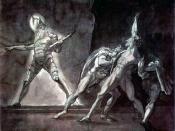Hamlet is the epitome of his own statement that, "there are more things in heaven and earth than are dreamt of in...philosophy" (I, v, 187-188). In his first appearance King Claudius describes the educated prince as "sweet and commendable" and declares that he loves him "with no less nobility of love than that which dearest father bears his son" (I, ii, 90-115). His high status and close relationship to the throne inform the audience that he is a significant individual and show that he is to be revered. However, Hamlet's churlish and self-pitying attitude reveals flaws that emerge as the play progresses. He is eventually trapped by his inability to act on his own convictions. Hamlet is the tragic hero of William Shakespeare's timeless play as a fatal flaw leads the commendable character to commit his hamartia and cause his untimely demise.
The prince is introduced as a brooding and loyal son who discovers the murder of his father and makes a passionate oath to avenge him at all costs.
His promise to the ghost of his father, King Hamlet, "I, with wings as swift as meditation, or the thoughts of love, May sweep to my revenge" (I, v, 35-37), show his deep sense of allegiance and respect for family. Hamlet's initial zeal reveals his good intentions. He is truly convinced that the murder of Claudius is the only way to preserve his honor. His obsession with honor carries him throughout the play; even as his initial fervor calms he proclaims, "Rightly to be great is not to stir without great argument, but greatly to find quarrel in a straw when honor's at stake" (IV, iv, 57-60). He sincerely believes that there is no cost too great to preserve your own dignity and in his own eyes avenging his father...


